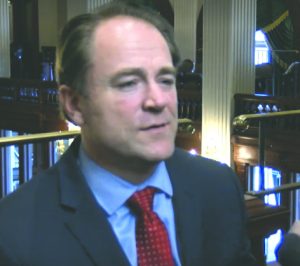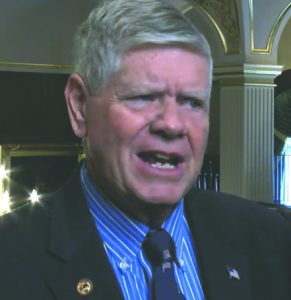Retired teachers, Republicans leery of budget plan
By Kevin Beese Staff Reporter — February 27, 2019
State Sen. Dan McConchie (R-Hawthorn Woods) gives his views about the governor’s budget address. “There were a lot of tax increases and insufficient cuts,” McConchie said. (BlueRoomStream.com)
Retired teachers and Republican lawmakers are among those concerned about Gov. J.B. Pritzker’s proposed budget.
Members of the Illinois Retired Teachers Association are imploring Pritzker to cease the decades-long practice of not fully funding the pension system.
An IRTA spokesman said that association members appreciate the difficult fiscal condition that the governor inherited, but feel that taking pension holidays is not the solution.
“The Illinois Retired Teachers Association has serious concerns about the governor’s proposed pension holiday,” IRTA President Roger Hampton said. “We are supportive of the proposals to infuse additional revenues into the pension funds for solvency, but not to underfund systems by hundreds of millions of dollars or be raiding one fund to give more to another. Delaying pension payments just kicks the can down the road again and costs future generations of Illinois taxpayers — if any are left — billions of dollars.”
During his Feb. 20 budget address, Pritzker proposed allocating $4.2 billion into the Illinois Teachers’ Retirement System, a figure $576 million too short of what is legally and ethically required to pay for the pension benefits of retired and current teachers, the association pointed out. They say it will result in reduced payments to TRS for years to come and will generate nearly $150 billion in increased costs to Illinois taxpayers.
“TRS is currently very poorly funded by actuarial standards at 40 percent of the assets needed for current benefits,” said Jim Bachman, IRTA executive director. “If Illinois had not taken pension holidays, like the one being proposed, the cost of TRS would be $1.2 billion. The state is paying 400 percent more because of statutory underfunding and a history of pension holidays. The Illinois retired teachers do not believe that the solution to the poorly funded pension systems is to make them more poorly funded and to continue the tradition that got Illinois in this problem in the first place.”
“The state of Illinois must keep its promise to the people, like retired teachers, that have always kept up their end of the bargain,” Hampton said. “The state of Illinois must fund its pension and retiree health care promises at levels that are both legally and ethically justified.

State Sen. Jim Oberweis (R-Long Grove) said that the annual budget address is a starting point for budget negotiations. “To succeed, we need good-faith negotiations,” Oberweis said. (BlueRoomStream.com)
IRTA leaders noted that the pension holiday is only focused on teachers outside of Chicago as Pritzker did propose increasing the payments to the Chicago Teachers’ Pension Fund.
Republican lawmakers also have concerns over what they heard in the governor’s budget address.
“There were a lot of tax increases and insufficient cuts,” state Sen. Dan McConchie of Hawthorn Woods said.
McConchie said that he and other Republicans are willing to work with the governor on his proposals, but noted that the spirit of cooperation between the parties that Pritzker touted when taking office was nowhere to be seen when Democrats pushed through the minimum wage hike to $15 per hour.
The Hawthorn Woods Republican said he was appreciative that Pritzker put forth a proposal for a capital improvements bill in his budget address.
“We do need a capital bill. We have 36,000 bridges in this state that are nearing the end of their lives,” McConchie said.
State Sen. Jim Oberweis of Long Grove said the annual budget address is a starting point for budget negotiations for the next fiscal year.
“Any spending plan will have its supporters and its opponents, but after years of political gamesmanship by the House speaker, we need a new approach,” Oberweis said. “To succeed, we need good-faith negotiations.”
Oberweis noted that Pritzker has said he is willing to negotiate and listen, and that Republicans will take him up on that.
“This is his chance to prove it, because on its face, his budget plan will need some changes that require compromise,” the Long Grove Republican said. “Right now, his plan calls for almost $1 billion in new spending, $2 billion in new borrowing, and a further deferral of about $800 million in required pension payments.
“He did not listen to our concerns on the minimum-wage bill. In fact, in his speech, he said, ‘The minimum-wage job is a lifetime ticket to poverty.’ What that overlooks is that minimum-wage jobs are entry-level jobs so that workers can learn skills and move on to higher-paying jobs. It is our hope that he will keep his promise and reach out to us, and listen to our ideas on this and other important issues. The residents of Illinois deserve no less.”
Oberweis said as the legislative budget process gets underway, he stands ready to work with fellow lawmakers to make the tough decisions to pass a balanced budget with structural reforms that will boost the economy and jobs.
The state’s 2020 fiscal year runs from July 1, 2019 to June 30, 2020.
State Sen. Donald DeWitte of St. Charles voiced concerns as well about the financial road map that Pritzker laid out in his budget address.
“I appreciate the governor’s opening comment about bold optimism,” DeWitte said. “I can only hope that correlates into bold compromise and bold bipartisanship. However, if the minimum-wage increase is any indication of what’s to come, then we still have a lot of work to do.”
Pritzker’s suggestions for balancing the budget included increasing taxes and borrowing millions of dollars for the pension crisis. For additional revenue, the governor called for the legalization and taxation of marijuana and sports betting, and a graduated income tax.
“I’ve said all along, we don’t have a revenue problem in this state; we have a spending problem,” DeWitte said. “Instead of proposing sufficient spending cuts, the governor proposed additional tax increases and is wanting to borrow money for the pension issue. These are the same ideas and policies that have led to the many problems facing out state today.
“I came into this process optimistic about working with the new governor and the new legislature, and I intend on keeping an open mind moving forward. However, we must come together in a bipartisan manner if we truly want to put Illinois on a path toward prosperity instead of destruction. I hope the governor will make good on his comments about reaching across the aisle to tackle these issues.”
Like and follow us on Facebook



